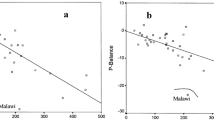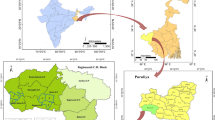Abstract
Sustainable agricultural development is a necessity for sustainable economic growth and social development in Africa. Sustainable agriculture largely depends on how effective natural and environmental resources are managed and utilized; it also depends on the security of continuous access to such resources. This research was aimed to look into trends in agricultural productivity, examine the persistence of the environmental insecurity, analyze the relationship between the two, and explore their links to the national development policies. The results are discussed in the context of relevance to national development policies and their implications on the sustainability of agriculture and rural livelihoods security. Literature survey, records collection from the stakeholders, village level participatory assessments (PAs), observations and questionnaire survey were tools used for data collection. The study shows significant (P < 0.01) declines in cereal crop yields, cattle milk yield and cattle calving rate, and increasing cattle mortality rate. Elements of environmental insecurity were found to account for decline in agricultural productivity; significant (P < 0.01) proportion (68%), of 266 households interviewed, reported land resources deterioration, declining soil fertility, and increasing drought frequencies as the causes of their low productivity. Declined fertilizer consumption and increasing variability in rainfall amount significantly (P < 0.01) accounted for 59% and 39%, respectively, of the variations observed in total annual production of rice and maize, which are major cereals in the study area. This study recommends measures to improve soil productivity such as improved fertilizer application and use of organic manures along with mineral fertilizers for maintaining soil productivity; education of farmers on sustainable use and management of land resources; and pro-poor rural policies in agricultural development and environmental governance.











Similar content being viewed by others
References
Abalu, G., & Hassan, R. (1998). Agricultural productivity and natural resources use in southern Africa. Food Policy, 23(6), 477–490.
Chamango, A. M. Z. (2001). Improving grain yield of smallholder cropping systems: A farmer participatory research (FPR) approach with legumes for soil fertility improvement in Central Malawi. (Paper presented at Seventh Eastern and Southern Africa Regional Maize Conference 11th–15th February 2001, Lilongwe).
Eriksen, S. (2001). Linkage between climate change and desertification in East Africa part 2: Policy linkages between climate change and desertification. Arid lands No. 49, May/June 2001.
Gathumbi, S. M., Ndufa, J. K., Giller, K. E., & Cadisch, G. (2002). Do species mixtures increase above-and belowground resource capture in woody and herbaceous tropical legumes? Agronomy Journal, 94, 518–526.
Hulme, M., & Kelly, M. (1993). Exploring the links between desertification and climate change. Environment, 35, 4–11.
IFDC. (2005). An action plan for developing agricultural input markets in Tanzania. Alabama: IFDC.
Kindall, H. W., & Pimentel, D. (1994). Constraints on the expansion of the global food supply. Retrieved October 21, 2004, from http://dieoff.org/page36.htm.
Lal, R., & Pierce, F. J. (1991). Soil management for sustainability. Ankeny, Iowa: Sod and Water Conservation Society of America.
Lowdermilk, W. C. (1986). Man made deserts. In R. P. C. Morgan (Ed.), Soil erosion and its control. New York: Hutchison Ross Publication.
Lukumbo, L. (1998). Grazing or farming-land conflict is escalating. Development Education Global News, 1/98, Retrieved May 14, 2005, from http://www.ms.dk/uk/global_news/gn_l/grazing.htm.
Malley, Z. J. U., Semoka, J. R. M., Kamasho, J. A., & Mzimbiri, K. M. (2006a). The use of trees and shrubs fallows for the sustainability of soil productivity and the environment in southwestern Tanzania. (Poster presented at the 2nd National Agro-forestry Workshop on Partnerships and Linkages for Greater Impact in Agro-forestry and Environmental Awareness, Mbeya).
Malley, Z. J. U., Taeb, M., Matsumoto, T., & Takeya, H. (2006b). Pastoralists’ conflicts, Environment and Agriculture in the Usangu plains, South-western Tanzania: Implications for Sustainable Human Security. (Paper Presented at the 1st COSTEC Scientific and Technological Conference on Growth and Poverty Reduction in Tanzania, Dar-es-salaam).
Malley, Z. J. U., Taeb, M., Matsumoto, T., & Takeya, H. (2007a). Linking perceived land and water resources degradation, scarcity and livelihood conflicts in southwestern Tanzania: Implications for sustainable rural livelihood. Environment, Development & Sustainability (in print). DOI 10.1007/s10668–006-9069-9.
Malley, Z. J. U., Taeb, M., Matsumoto, T., & Takeya, H. (2007b). Environmental change and vulnerability in Usangu plain, Southwestern Tanzania: Implications for sustainable development. The International Journal of Sustainable Development and World Ecology, 14(2), 145–159.
Mpinga, J. (1999). Usangu: Where the Gods are Not Just Crazy, But Angry, Too. The East African, July 7–13, 1999.
Mwalukasa, E. H. (2002). Effects of land degradations in the uplands on land use changes in the plains: The case study of Chimala River catchment in the Usangu Plains. M. Sc. Dissertation, Sokoine University of Agriculture.
Neely, C. L., & Butterfield, J. (2004). Holistic management of African rangelands. Magazine on Low External Input and Sustainable Agriculture, 20(4), 26–28.
Pimentel, D. (1990). Environmental and social implications of waste in Agriculture. Journal of Agricultural Environmental Ethics, 3, 5–20.
Scoones, I., & Toulmin, C. (1999). Policies for soil fertility management in Africa. London: Department for International Development.
SMUWC. (2002). Baseline 2001, Retrieved July 2, 2004, from http://www.usangu.org/baseline2001/part1–5.shtml.
Sosovele, H., & Ngwale, J. J. (2002). Socio-economic root cause of the loss of biodiversity in the Ruaha catchment area. Dar-es-salaam: WWF-Tanzania.
Stocking, M. (2002). Agro diversity, environmental protection and sustaining rural livelihoods: the global view. In H. Brookfield, C. Padoch, H. Parsons, & M. Stocking (Eds.), Cultivating biodiversity: Understanding, analyzing & using agricultural diversity. London: ITDG Publishing.
WCED. (1987). Our common future. In G. H. Brundland (Ed.), Oxford: The World Commission on Environment and Development.
Wortmann, C. S., & Kaizzi, C. K. (2000). Tree legumes in medium–term fallows: Nitrogen fixation, nitrate recovery and effects on subsequent crops. African Crop Science Journal, 8(3), 263–272.
Acknowledgements
The International Foundation for Science (IFS) in Sweden and the United Nations University Institute of Advanced Studies (UNU-IAS) in Japan financially supported this study. The Ministry of Agriculture and Food Security in Tanzania made its research facilities available for the work and administered the funds at the Agricultural Research Institute-Uyole (ARI-Uyole). Authors also wish to thank Ms C. Kabungo, Ms S. Swai and Mr. J. Kaijage, of ARI-Uyole and the Mbarali District Council Agricultural workers from the district to the village level for their assistance in field data collection.
Author information
Authors and Affiliations
Corresponding author
Additional information
Readers should send their comments on this paper to: BhaskarNath@aol.com within 3 months of publication of this issue.
Rights and permissions
About this article
Cite this article
Malley, Z.J.U., Taeb, M. & Matsumoto, T. Agricultural productivity and environmental insecurity in the Usangu plain, Tanzania: policy implications for sustainability of agriculture. Environ Dev Sustain 11, 175–195 (2009). https://doi.org/10.1007/s10668-007-9103-6
Received:
Accepted:
Published:
Issue Date:
DOI: https://doi.org/10.1007/s10668-007-9103-6




